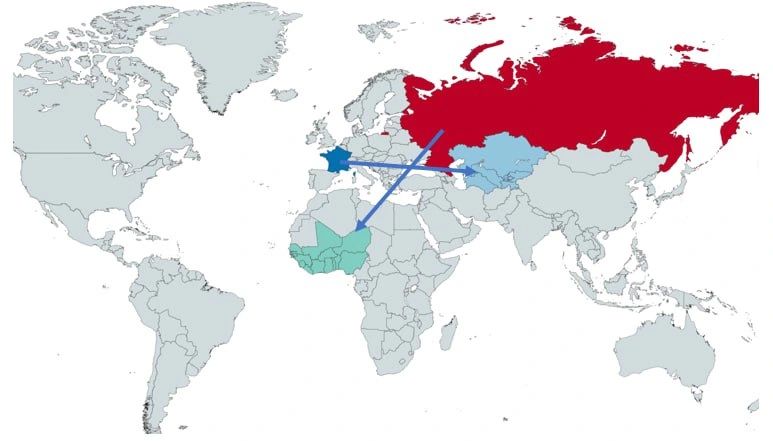French President Emmanuel Macron's recent visit to Central Asia has raised eyebrows and sparked speculation about the motives behind this unexpected diplomatic engagement, Eldaniz Gusseinov, a foreign policy analyst from Central Asia shared on LinkedIn. While some point to the region's strategic uranium reserves as a primary reason, a deeper analysis suggests that the visit may be a response to events unfolding in West Africa.

The trigger, Gusseinov claims, for this strategic shift was the coup in Niger, which unfolded in the summer of 2023. The coup not only resulted in a decline in France's influence in Niger but also led to the withdrawal of French troops and the expulsion of the French ambassador. This setback was exacerbated by a media narrative portraying Russia as displacing France, the former colonial master, from West Africa.
Central Asia in the Crosshairs
Simultaneously, a growing discourse in the West suggested that Russia was losing its grip on Central Asia. Macron's unexpected appearance in the region is seen as a deliberate move in this battle of narratives. As the narrative of Russia allegedly pushing France out of Africa dominated headlines, France made a strategic move into what Bloomberg journalists referred to as Putin's "backyard" – Central Asia.
While uranium supplies from Kazakhstan to the European Union have been a consistent aspect of their relationship, the urgency of Macron's visit suggests it goes beyond mere resource agreements. France's struggle to counter the narrative of losing influence in Africa prompted the need for a powerful counter-move.
Catalyst for Alliance Building
Before the coup in Niger, countries in West Africa, including Mali and Burkina Faso, were contemplating military intervention with the support of France to restore constitutional order. However, the operation never materialized, leading to the formation of a defense alliance among the countries that experienced anti-French coups – Mali, Burkina Faso, and Niger.
Notably, these nations were visited by Russia's Deputy Minister of Defense, Yunus-Bek Yevkurov, further complicating France's position in the region. To counteract the potential tarnishing of its leadership image within the European Union, France aimed to make a strategic move targeting a region traditionally seen as within Russia's sphere of influence – Central Asia.
Macron's decision to send air defense systems to Kazakhstan, under the pretext of "strengthening the country's sovereignty," was a calculated move. It aimed to demonstrate that, in response to the narrative of Russia expanding its influence in Africa, France could assert itself in Central Asia. However, skepticism lingers regarding the significance of this move, particularly considering the long absence of French leaders in the region before Macron's recent visit.
While traditional views suggest that France has always had an interest in Central Asia, the timing of Macron's visit raises questions about the real motivations behind this sudden engagement.
Macron in Uzbekistan
During his historic visit to Uzbekistan, President Emmanuel Macron expressed unwavering support for Uzbekistan's accession to the World Trade Organization (WTO). The meeting between the presidents of Uzbekistan and France, a momentous event marking the first visit by a French president to Uzbekistan in 30 years, showcased a shared commitment to cultural and humanitarian cooperation. President Macron's enthusiasm extended to a joint business forum in Samarkand, where significant agreements were signed in crucial sectors such as energy, metallurgy, water supply, agriculture, and transportation.
Macron's Diplomatic Sojourn in Kazakhstan
President Emmanuel Macron's official visit to Kazakhstan on November 1 aimed at fortifying the strategic partnership between the two nations saw him and President Kassym-Jomart Tokayev engaging in a cultural exchange at the "Ethnoaul" exhibition. This celebration of Kazakhstan's diverse cultural heritage provided a unique backdrop for both leaders to immerse themselves in the artistic treasures of the Central Asian nation.
Macron welcomed the Kyrgyz President to Paris
As part of his official working visit to Paris, Kyrgyz President Sadyr Japarov engaged in fruitful negotiations with French President Emmanuel Macron on November 10. Focusing on current aspects of Kyrgyz-French cooperation, the discussions highlighted the commitment to elevate bilateral relations to a strategic partnership. Both leaders expressed keen interest in strengthening ties, particularly in transportation, trade, and economics.
Follow Daryo's official Instagram and Twitter pages to keep current on world news.
Comments (0)